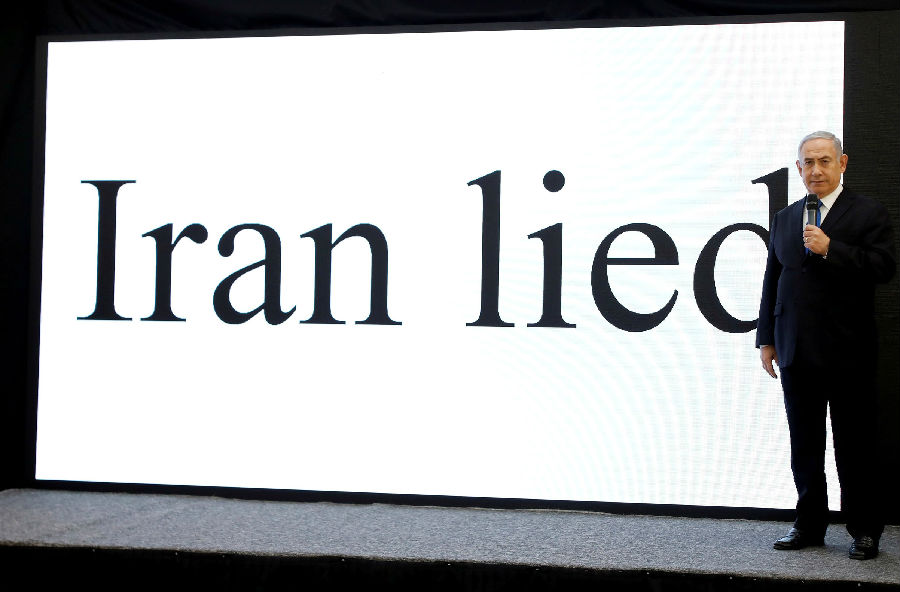Trump’s dilemma on Iran deal: to Nix, or Fix
特朗普在伊朗問題上的兩難境地:要么拒絕,要么解決
By Karl Vick
文/卡爾·維克
DIPLOMACY IS SUBTLE, ATOMIC SCIENCE complex.
外交是很微妙的,原子科學又很復雜。
But the perceived villainy of Iran by the average American is the stuff of cartoons.
但普通美國人眼里伊朗的邪惡卻是漫畫里的那種邪惡。
At the time the nuclear deal with the Islamic Republic was signed by the U.S. and its five global partners in 2015,
2015年,美國及其五個國際伙伴與伊朗簽署核協(xié)議時,
Gallup found 84% of the American public viewed Iran “unfavorably.”
蓋洛普調(diào)查發(fā)現(xiàn),84%的美國公眾都對伊朗持“負面看法”。
The abiding antipathy the U.S. public feels toward Iran encouraged Donald Trump to attack the nuclear pact as a populist candidate.
美國公眾對伊朗的反感態(tài)度由來已久,這不僅給了唐納德·特朗普以民粹主義候選人的身份對這一核協(xié)議展開攻擊的契機,
It also prompted Congress to give the U.S. President the levers to undo the deal,
也促使美國國會賦予了總統(tǒng)撤銷該協(xié)議的權力,
which lifted sanctions on Tehran in exchange for strict limits on its nuclear program.
于是,美國解除了對德黑蘭的制裁,以換取對伊朗核計劃的嚴格限制。
Skeptical lawmakers passed a law in 2015 requiring that any deal be “recertified” every 90 days by the President.
心存疑慮的議員們在2015年通過了一項法律,要求任何交易總統(tǒng)都要每90天對其進行一次“重新認證”。
On May 12, Trump gets his hand on those levers again—
5月12日,特朗普再次伸手要行使這些權力——
and he seems to be on the fence about whether to finish it off.
但他似乎在猶豫是否要終結(jié)這一協(xié)議。
International observers say there’s no reason for Trump to vacillate.
國際觀察人士說,特朗普本來沒有理由猶豫。
The International Atomic Energy Agency (IAEA), the U.N. body that conducts inspections,
負責監(jiān)督的聯(lián)合國機構“國際原子能機構”(IAEA)表示,
says Iran’s nuclear program has been taken down precisely as promised.
伊朗的核項目已經(jīng)完全按照承諾被拆除了。
An enterprise that in 2015 could have produced a nuclear warhead within months has largely been dismantled and is closely monitored.
一家2015年時就能在幾個月內(nèi)生產(chǎn)出核彈頭的企業(yè)如今基本已拆除,目前還在密切監(jiān)控之下。
The U.S.—plus China, Russia, Germany, France, Britain and the E.U.—all have gotten what they asked for.
美國,還有中國、俄羅斯、德國、法國、英國和歐盟各方都已得償所愿。

Trump wants more.
His Administration argues that the deal is fatally flawed because it’s not permanent.
他的政府聲稱,該交易有著致命的缺點,因為它不是永久性的。
After a decade, Iran would be allowed to resume enriching some uranium,
and go back to basically business as usual after 15 years.
15年后基本就能恢復其之前的水平。
“That’s not acceptable. (2025) is tomorrow,” Trump said at an April 30 press conference.
“這點讓人無法接受。(2025年)轉(zhuǎn)眼就到了,”特朗普在4月30日的新聞發(fā)布會上說。
But he added: “That doesn’t mean we won’t renegotiate a real agreement.”
但他還補充到:“這并不是說我們就不會就真正可行的協(xié)議重新談判了。”
Secretary of State Mike Pompeo and National Security Adviser John Bolton, both hawks on Iran,
國務卿邁克·蓬佩奧和國家安全顧問約翰·博爾頓,兩人在伊朗問題上都持鷹派立場,
have said the May 12 decision hinges on finding a credible way to do that.
都表示,5月12日的決定取決于能不能找到一種可信的方式來實現(xiàn)這一目標。
ONE PERSON intent on having his say is Israeli Prime Minister Benjamin Netanyahu,
以色列總理本雅明·內(nèi)塔尼亞胡執(zhí)意要發(fā)表自己的看法,
who took to the airwaves from Tel Aviv on April 30 to unveil what he described as an intelligence coup:
4月30日,他在特拉維夫通過電視揭露了他所謂的“情報政變”:
55,000 pages and 183 discs carried out of Tehran warehouses by Mossad agents.
摩薩德特工從德黑蘭倉庫帶走了55000頁資料外加183張碟片。
Netanyahu, who opposes the pact, described in detail what outside observers, including the IAEA, had known for years—
對該協(xié)議持反對態(tài)度的他還詳細描述了包括國際原子能機構在內(nèi)的外部觀察機構多年前就已知曉的一個問題——
that Iran had once pursued a nuclear weapon, dubbed Project Amad.
伊朗曾試圖開展一個代號‘“阿馬德工程”的核計劃。
譯文由可可原創(chuàng),僅供學習交流使用,未經(jīng)許可請勿轉(zhuǎn)載。












